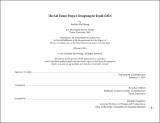The Salt House Project : Designing for Death (DfD)
Author(s)
Hwang, SunMin May
DownloadFull printable version (14.39Mb)
Alternative title
Testing radically rapid turn-over of building life-cycle
Salt House Project : DfD
Other Contributors
Massachusetts Institute of Technology. Department of Architecture.
Advisor
Brandon Clifford.
Terms of use
Metadata
Show full item recordAbstract
We as architects consider ourselves creators. We work under the false assumption that buildings will last forever. However, the fact is that every building eventually dies. This thesis rethinks the question of death. The Salt House Project is a product of this questioning. It tests radically rapid turnover of the building life cycle in the Islands of Galapagos, Ecuador. The thesis is carried out by designing a salt-cured seasonal residence, which will gradually and naturally be demolished over a designated period of time. The building life expectancy will be precisely set out from the beginning to the end-purporting each and every step of its life cycle -from occupation to demolition. It will be constructed and disappear back into the nature within a one-year life cycle. Some parts will obviously remain for a longer period of time depending on its structural integrity. However, the big picture is that the house will evolve-decay over time, varying not only in its form but also in its function. To implement this idea, all building materials will be based on natural resources including salt, soil, gravel, sand and coconut fiber. Water and heat will be the binding solution of the building structure and wind and rain will act as demolition agents. This thesis challenges the attempt to alleviate building obsolescence over time by reversely mandating a building's life expectancy. In doing so, we achieve firstly, a sympathetic connection between geometry and material and secondly, a vitality to achieve eccentric expressions of life styles that can be highly unique and customized. In fact, the way we operate shifts dramatically when we design for death as opposed to perpetuity.
Description
Thesis: M. Arch., Massachusetts Institute of Technology, Department of Architecture, 2014. Subtitle on abstract page reads: Testing radically rapid turn-over of building life-cycle Cataloged from PDF version of thesis. Includes bibliographical references (pages 152-153).
Date issued
2014Department
Massachusetts Institute of Technology. Department of ArchitecturePublisher
Massachusetts Institute of Technology
Keywords
Architecture.